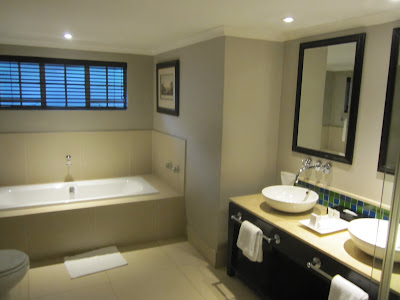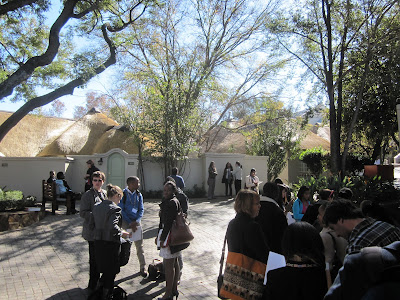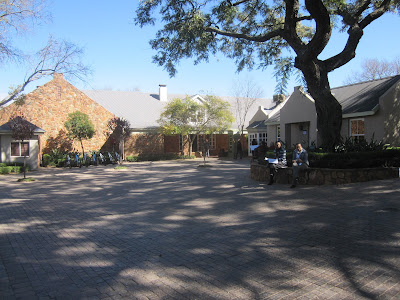This
past week was the last of the semester; I spent the week marking my students'
examination and finishing up other administrative responsibilities for the
semester.
One
new development that I am looking forward to next semester is teaching a
compulsory course for first-year students called "Becoming a
Teacher." I talked to one of the lecturers with whom I work on a research
project about my interest in teaching "Becoming a Teacher," not
knowing that she is currently teaching the course. Not having taught before,
she asked if I would want to switch teaching responsibilities next semester (not
teaching before makes teaching "Becoming a Teacher" a bit difficult,
she admits). This is a course that I am much more interested in and I feel like
I will make a much larger impact teaching this course, rather than "New
Literacies for Teachers" (the course I taught last semester). Honestly, I
feel that this class has more purpose and is much more influential on the
future teachers in the class. The aims of the course are: 1) to explore and
clarify conceptions of teaching and learning; 2) to establish foundations for
subject-specific methodology by establishing foundations for the development of
pedagogical thinking; 3) to enhance the students' abilities to observe and
understand classroom teaching, 4) to provide students with models of coherent
materials and the opportunities to analyse these learning materials, and 5) to
develop a professional teacher identity.
I
continued on my documentary-kick, watching Dancing with the Devil this week. It's about the drug trafficking in the favelas
(shantytowns) in Rio de Janeiro. Somehow, the filmmakers were able to interview
three of the most powerful leaders of the drug-trafficking gangs. The
documentary aimed at showing both sides of the "war" on drug
trafficking, by interviewing and following Rio de Janeiro police as well. It
was really insightful and eye-opening.
Next
weekend, Giulia, Gerhard, Marlize, the girls, and I leave for our road trip around
Southern Africa. The 4500 km journey will take two weeks - it will be an
incredible trip and we'll be able to see much of the country (and
Botswana/Namibia). We'll first head to Kimberley (with the large diamond pit),
stay the night, and then head north to the Kalahari (see the map for a visual!).
The first night, we're staying in a bed and breakfast about an hour away from
the park. The second night, we'll camp in the Kalahari Transfrontier National
Park (a la Boy Scouts), then stay a night outside of the park in a bed and
breakfast. I'm really looking forward to seeing the Kalahari. I read a book
called Kalahari Days and Hyena Nights
about a scientist who lived in the park and tracked the hyenas (both brown and
spotted). Reading the book helped me to picture to landscape and learn more
about the amazing wildlife there. From the Kalahari, we head west to Namibia -
staying at Ai-Ais, a hot spring near the Fish River Canyon. The next night,
we'll go to a lodge near the canyon, which is the second largest in the world
aside from the Grand Canyon. Gerhard and family then head home, with Giulia and
I traveling down the western coast of South Africa toward Cape Town. We'll stay
a night in Paternoster, a beach town on the Atlantic, about two hours north of
Cape Town. We're staying two nights in Cape Town (spending a day in
Stellenbosch/Paarl to do wine tasting). After Cape Town, we'll head to
Oudtshoorn by way of the Garden Route, stopping at Betty's Bay to see the
penguin reserve. In Oudtshoorn, we'll ride ostriches, go to the Cango Caves,
and pet cheetah/lions at a nature reserve (Giulia's pick!). Before heading to
Port Elizabeth, we'll stay a night in Plettenberg Bay, a beautiful little town
on the ocean. The next day we'll go to Port Elizabeth and stay with wonderful
family friends, Raymond and Sylvia (they/their families were both members of my
Great-Grandfather's church in Frankfort, South Africa). Then, we'll head to
Addo Elephant Park (there are more than just elephants - it’s a national
park!), see the wildlife, and then go on a safari in a private game reserve.
The next day, we'll head back to Johannesburg! It should be an incredible trip
and I hope that there aren't any unexpected problems. Rest assured: I had the
car checked before leaving and I'm a member of the South African Automobile
Association!
Map:
http://goo.gl/maps/yTIY
During
the trip I don't plan on updating the blog, but rest assured, I will write a
massive update when we get back.
 |
| Starting in Johannesburg and going counter-clockwise |











